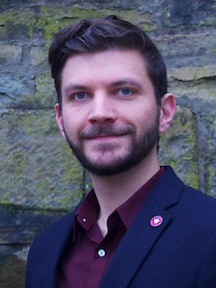By Alexis Sargent
William McInerney (ΦBK, University of North Carolina-Chapel Hill, 2011) has been awarded the prestigious Gates Cambridge scholarship, which provides full support for postgraduate study in any subject at the University of Cambridge in England. Established by the Bill and Melinda Gates Foundation in 2000, the Gates Cambridge scholarship supports scholars in a variety of fields who convey outstanding intellectual ability, leadership potential, and a commitment to improving the lives of others.
McInerney graduated from the University of North Carolina-Chapel Hill in 2011 with a bachelor’s degree in peace, war, and defense. During his undergraduate years, McInerney discovered the power of poetry in the classroom and studied arts education and peacemaking.
At UNC-Chapel Hill, McInerney served as the executive director of the spoken word poetry and peace education nonprofit Sacrificial Poets and worked to develop conversations with high school students about understanding masculinity and violence prevention. As much of his efforts targeted at-risk youth, McInerney began to notice that his work in the classroom had a significant positive impact on young men understanding their gender identity, the privileges of being male in a patriarchal society, and what masculinity means to them.
“I found that the work that we were doing, while it benefitted young men and young women, immensely assisted the young men in our groups,” said McInerney. “A lot of the young men in the classroom really needed the support, the means to expand their emotional intelligence, and a community to process who they were and how they were feeling.”
Arts education and personal narratives became a means for McInerney and the young boys involved in his community service to understand how they were socialized in their masculinity, and how they could shift these societal binds and combat the patriarchal threat of male violence against women.
McInerney became interested in bridging the gaps between the realm of arts education and the role of male advocacy in preventing violence against women. After graduation, he developed and facilitated the UNC-Chapel Hill Men’s Project, a men’s violence prevention program for undergraduate and graduate students at the University.
Bob Pleasants, assistant director of the Learning Center and clinical assistant professor in education at UNC-Chapel Hill, served as a mentor to McInerney through his roles in Sacrificial Poets and the UNC Men’s Project.
“Will is able to condense complex topics, make challenging content accessible for a number of audiences, and teach these in ways that are understandable. When speaking to other men to prevent violence against women, he uses a soft touch and a creative way of teaching,” Pleasants observed. “Will is both relatable to younger men and projects great authority and wisdom beyond his years that fosters trust to his audiences.”
McInerney won a Rotary Peace Fellowship to study conflict resolution at the University of Bradford in the United Kingdom, where he completed a master’s degree 2018. McInerney became very interested in Cambridge University during his Rotary Peace Fellowship and spent a month conducting independent research at Cambridge University and working with a Cambridge peace and education research group. Through these experiences, he was able to meet his current advisor at the University of Cambridge, Hillary Cremin, a senior lecturer in education.
As a Gates Cambridge Scholar, McInerney will pursue a PhD in education from Queens’ College of Cambridge. There he will continue his research in creative educational approaches related to the prevention of men’s violence against women.
McInerney believes that his membership in Phi Beta Kappa has been crucial to his success. “Phi Beta Kappa is one of the most prestigious and long-running academic societies in the country,” he said. “The honor of being a part of that is immense and has universal acknowledgment. I valued the opportunity to be involved in Phi Beta Kappa at the University of North Carolina-Chapel Hill. It has most certainly helped me propel my professional career and certainly my academic career.”
“Will offers a powerful testimonial to the value of a liberal arts education. You can see the consequences of Phi Beta Kappa in William’s work and in his career,” said James Leloudis, history professor and faculty advisor to Phi Beta Kappa at UNC-Chapel Hill. “He has made wonderfully creative use of the arts, particularly in poetry, in the work he is committed to in violence and peacemaking.”
Alexis Sargent is a senior at Michigan State University studying social and public policy. She was inducted into Phi Beta Kappa in spring 2018, during her junior year. Michigan State University is home to the Epsilon of Michigan chapter of Phi Beta Kappa.




